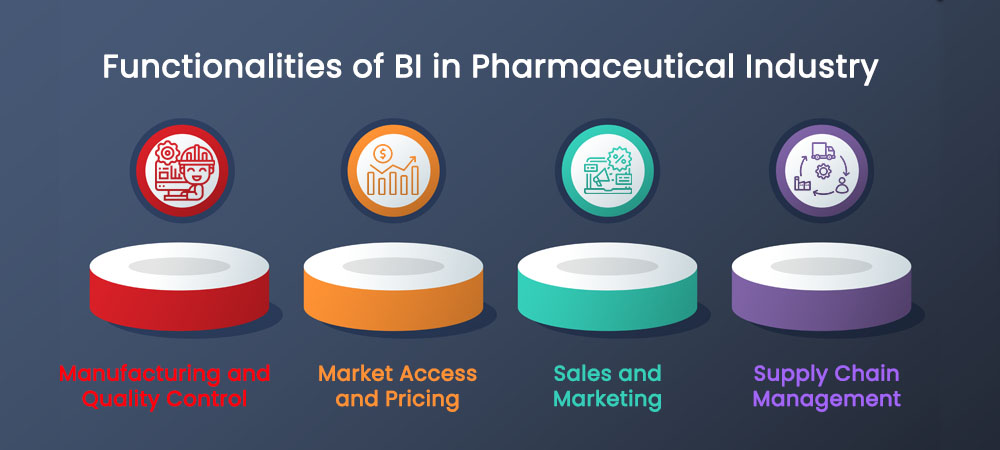Harness Business Intelligence for Smarter Decisions and Innovation with Best BI Software for Pharmaceutical Industry.
Elevating Data-Driven Excellence with Best BI software for Pharmaceutical Industry
Unlock the full potential of your pharmaceutical endeavors with the transformative power of data-driven insights. At ESS, we specialize in revolutionizing your business intelligence capabilities, tailored specifically for the pharmaceutical industry. Our mission is to equip every facet of your pharmaceutical team with real-time, comprehensive analytics that empowers strategic decision-making.
With our industry-specific expertise and cutting-edge solutions, we unveil the hidden gems within your pharmaceutical data. Discover patient trends, optimize operations, and gain a competitive edge in the dynamic world of pharmaceuticals. Elevate your pharmaceutical enterprise to new heights with ESS - where data becomes your most potent asset.
Functionalities of BI in Pharmaceutical Industry:
1. Manufacturing and Quality Control:
• Process Optimization: Optimize manufacturing processes using data analysis to improve efficiency and reduce waste.
• Batch Record Review: Analyse batch records to ensure product quality and compliance.
• Quality Management: Monitor and maintain product quality throughout the manufacturing process.
• Track and Trace: Implement traceability systems for pharmaceutical products.
• Trend analysis: This can track how BMR and BPR values have changed over time. This can help to identify trends such as increasing waste or decreasing efficiency.
• Benchmarking: This can be used to compare BMR and BPR values to industry benchmarks. This can help to identify areas where the company is underperforming.
• Root cause analysis: This can be used to identify the root cause of problems with BMR or BPR. This can help to develop targeted solutions to improve the manufacturing process.
2. Market Access and Pricing:
• Market Access Strategy: Analyse market data to develop pricing and access strategies.
• Pricing Analytics: Determine optimal pricing strategies based on market conditions and competition.
• Reimbursement Analysis: Analyse reimbursement policies and develop reimbursement strategies.

3. Sales and Marketing:
• Sales Performance: Analyse market data to develop pricing and access strategies.
• Targeted Marketing: Segment customers and physicians for targeted marketing campaigns.
• KOL Engagement: Identify Key Opinion Leaders (KOLs) for engagement strategies.
• Competitive Analysis: Monitor competitor activities and market share.
4. Supply Chain Management:
• Demand Forecasting: Predict product demand to optimize inventory levels and distribution.
• Inventory Management: Manage inventory efficiently to avoid shortages or overstocking.
• Supplier Performance: Analyse and optimize relationships with pharmaceutical suppliers.
• Cold Chain Management: Ensure the integrity of temperature-sensitive products during transportation.
Benefits of BI in Pharmaceutical Industry:
1. Improved Decision-Making: BI tools help pharmaceutical companies make informed decisions based on real-time data and analytics. This includes decisions related to drug development, clinical trials, marketing strategies, and supply chain management.
2. Regulatory Compliance: BI helps ensure compliance with regulatory requirements, such as the FDA's guidelines for electronic records and signatures (21 CFR Part 11). It aids in tracking and reporting necessary data for regulatory submissions.
3. Market Access and Pricing Strategies: BI provides insights into market dynamics, reimbursement policies, and competitive landscapes. This helps companies develop effective pricing strategies and navigate market access challenges.
4. Sales and Marketing Effectiveness: BI helps sales and marketing teams target healthcare providers and patients more effectively by analyzing prescribing patterns, patient demographics, and physician preferences.
5. Supply Chain Optimization: BI optimizes supply chain operations by providing visibility into inventory levels, demand forecasting, and distribution. This reduces costs and prevents drug shortages.
6. Quality Control: BI systems can monitor and ensure product quality throughout the manufacturing process, reducing the risk of product recalls and quality-related issues.
7. Cost Reduction: BI identifies areas where cost-saving measures can be implemented, such as optimizing manufacturing processes, reducing waste, and improving resource allocation.
8. Risk Mitigation: By analyzing data, BI helps pharmaceutical companies identify and mitigate risks associated with drug development, manufacturing, and market access.
9. Real-Time Monitoring: BI provides real-time data monitoring and alerts, allowing companies to respond quickly to emerging issues and opportunities.
10. Data Visualization: Visual dashboards and reports make complex data more accessible and understandable, enabling non-technical users to gain insights easily.
11. Strategic Planning: BI supports long-term strategic planning by providing historical and predictive analytics, helping pharmaceutical companies make decisions that align with their business goals.
12. Competitive Advantage: BI allows pharmaceutical companies to gain a competitive advantage by staying ahead of market trends, identifying opportunities, and responding to changes more rapidly than competitors.
13. Operational Efficiency: BI optimizes internal processes, streamlining operations and reducing administrative overhead.

FAQ
Q1: Why is BI important for Pharma Manufacturing?
BI in pharmaceutical industry is crucial for manufacturing because it enables data-driven decision-making throughout the production process. It helps optimize operations, improve quality control, and ensure compliance with regulatory standards. BI tools provide insights into production efficiency, batch quality, and resource allocation, leading to cost savings and enhanced product quality.
Q2: What are the applications for business intelligence in pharma?
BI for pharmaceutical industry has various applications, including:
• Clinical Trials Management: BI helps streamline the management of clinical trials, from patient recruitment to monitoring trial progress.
• Regulatory Compliance: It aids in maintaining compliance with strict regulatory requirements, ensuring data integrity and accurate reporting.
• Supply Chain Optimization: BI optimizes inventory management, distribution, and supplier relationships, reducing costs and preventing shortages.
• Drug Development: BI supports drug discovery and development by analyzing research data and identifying promising drug candidates.
• Sales and Marketing: It helps in market segmentation, sales performance analysis, and targeted marketing strategies.
• Quality Control: BI ensures consistent product quality throughout manufacturing processes.
Q3: What are the benefits of BI in the Pharmaceutical Industry?
The benefits of BI in the pharmaceutical industry include:
• Improved decision-making based on data-driven insights.
• Accelerated drug development and reduced time-to-market.
• Enhanced regulatory compliance and reporting.
• Efficient supply chain management, reducing costs and preventing shortages.
• Better patient care through data analysis.
• Competitive advantage through market insights and targeted marketing.
• Cost reduction and optimization of operations.
Q4: What role does BI play in the pharma sector?
BI in Pharmaceutical Industry plays a pivotal role in optimizing processes, ensuring regulatory compliance, and enhancing decision-making. It empowers pharmaceutical companies to leverage data for efficient drug development, clinical trial management, supply chain optimization, and more. BI is the driving force behind informed strategic decisions and improved patient outcomes in the pharmaceutical industry.
